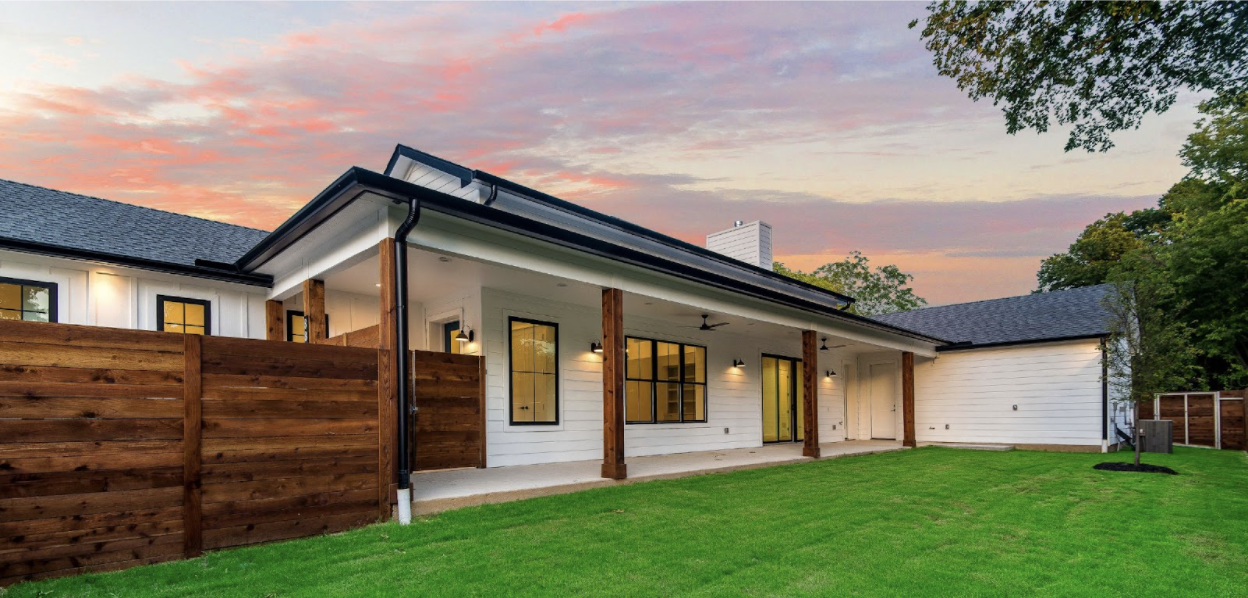
Fox Blocks Ensure an Energy-Efficient Home in Hot and Humid Dallas

Building an energy-efficient home in hot and humid Dallas requires a high-performing wall system, like Fox Blocks insulated concrete forms (ICFs). Fox Blocks ICF wall systems contribute towards a tight-building envelope, controlling air and moisture transfer through the walls, to ensure a comfortable and healthy home, and save money on energy bills.
By 2036, Days Above 100°F Will Double in Dallas
When designing and building an energy-efficient home, it's important to consider the extreme heat and humidity of the region. Much of the year, the relative humidity in Dallas reaches 81.5 percent in the early morning, dropping to near 48.5 percent in the late afternoon. The area also experiences summer temperatures of near 100° F.
Since the 1970s, increasing temperatures threaten the environment (growing number of severe storms, drought, and wildfires) and health (heatstroke, heat exhaustion, hyperthermia, dehydration, and in extreme cases, death).

Rising Temperature and Rainfall Events
A recent climate report predicts an increase of 2 to 3 percent in expected extreme rainfall intensity in 2036 compared to 2001-2020, and an overall increase of 6 to 10 percent compared to 1950-1999.
Furthermore, the report also predicts that by 2036 the average annual Texas surface temperature will increase by 3.0° F. The forecast is a doubling of days over 100° F compared to 2001-2020.

Building an Energy-Efficient Home in Dallas
Building an energy-efficient home will protect a family’s health and financial stability by creating comfortable-safe homes with manageable energy bills. Energy-efficient homes safeguard the environment and contribute to battling global warming. Critical components of an energy-efficient home in Dallas include a tight building envelope, proper placement of rooms, windows, and ductwork, and site orientation.
A Tight Building Envelope
A tight building envelope minimizes air infiltration and heat gains to help keep a cool and dry house. Vital design features of a tight building envelope include continuous insulation (CI) and an air and moisture barrier. An air and moisture barrier stops moisture intrusion and air leakage, both of which may lead to structurally damaging and unhealthy mold. The building envelope must consider all the exterior elements of the house: the walls, foundation, roofing, and glazings.
Energy-Efficient Walls
Designing a Dallas home with a tight building envelope must include exterior walls with reasonably high effective R-value, like those built with Fox Blocks ICFs.
Fox Blocks ICF high thermal mass walls with an R-value of 23 provide continuous insulation with no thermal bridges, for an energy-efficient, moisture-resistant and healthy home. The manufacturing of Fox Blocks includes two panels of 2 ⅝” thick, Type II expanded polystyrene (EPS) insulation. EPS insulation produces a wall system with long-term thermal resistance performance, compared to Polyios and XPS insulations, which have been proven to lose R-value over time. Fox Blocks surpasses ASHRAE/ANSI 90.1 energy code mandates for all climate zones.
The high thermal mass of the ICF continually moderates the temperature change through the wall assembly to reduce the air conditioning load for the interior space. Testing has shown that the effective R-value of ICF wall assemblies improves in hot climates.
Energy-Efficient Foundations
A Fox Blocks ICF foundation creates a tight building envelope by providing thermal mass, a continuous air barrier, and a high R-value.
Fox Blocks ICF foundation walls also include a vapor retarder which more effectively prevents moisture intrusion and the possibility of structurally damaging and unhealthy mold and rot.
The Roof of an Energy-Efficient Home
A cool roof protects against solar heat gains in order to keep the house and attic areas cool. For example, slate roofs keep a roof cool because they reflect the sunlight. In contrast, dark-asphalt shingles do not keep a roof cool because they absorb the Sun’s heat. As a result, cool roofs limit solar heat gains, lower energy bills, and improve indoor comfort.
The Glazings of an Energy-Efficient Home
The design of an energy-efficient home should include energy-efficient doors, windows, and skylights suitable to Dallas’s climate zone.
The Room and Site Orientation
Room orientation plays a vital role in creating an energy-efficient home in Dallas:
North-facing rooms have good day-long sunlight. They are perfect for shared living spaces like the family room.
East-facing rooms have good sun in the morning and are cool during the late afternoon, making them suitable for kitchens and bedrooms.
South-facing rooms have low levels of Sun exposure and are best suited for garages, laundries, and bathrooms.
West-facing rooms get the late afternoon sunlight, which may be uncomfortable for kitchens and bedrooms.
Site orientation of the home should take advantage of the Sun’s energy. In Dallas, the north-south orientation of homes reduces direct sunlight during the summer (which lessens cooling demands) and maximizes daylight during the winter (reducing heating demands).
Ductwork Location
An energy-efficient home in Dallas must include the ductwork inside the home’s envelope. Ducts located in unconditioned areas can increase cooling costs by 15 percent. In hot and humid regions like Dallas, water can collect on the overheated ductwork.
Building an Energy-Efficient Home with Fox Blocks
The best design of an energy-efficient home in Dallas will ensure a healthy, durable, and comfortable house. The design of an energy-efficient home in Dallas must include:
A tight building envelope
Proper orientation of the home
Room and window placement
Ductwork location in the house
Balanced air handling with a ERV (HRV)
Fox Blocks ICFs is a superior above and below-grade wall product for building an energy-efficient home in Dallas, which creates a tight building envelope, in order to limit air and moisture infiltration. It saves homeowners money and energy, creates a healthy and comfortable home, and protects the environment.
For more tips on building a home in Dallas, contact Fox Blocks professionals today.